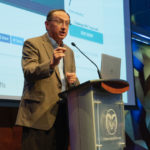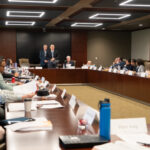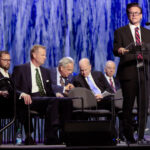
SAN FRANCISCO (BP)–Ministers wanting to shape important doctrinal understandings and education in people’s lives today must become good storytellers, declared a Southern Baptist seminary professor.
“At stake may be the effectiveness of our reaching emerging postmodern and existing pre-modern generations with the good news of the kingdom of God,” said Rick Durst, professor of theology and academic dean at Golden Gate Baptist Theological Seminary near San Francisco.
Durst cited three converging trends demanding good storytelling as a tool for education — postmodernism, narrative theology and “storying” as a current communication method.
He added some researchers find theological understanding built upon narrative, rather than concepts or systematic categories, is more effective in today’s societies.
“Storytelling is gaining broad attention as a critical method for communicating truth to the emerging generation,” he said. “In the postmodern world, to be a storyteller is no longer a euphemism for someone with a loose grip on truth.”
Durst acknowledged personal interest in the issue: “At stake for me are both my hope to keep faith with you in reaching our generation for Jesus and my hope for the effective discipleship and congregationalization of the three postmoderns who call me ‘dad’.”
Teaching truth through storytelling, Durst said, appeals to a God-given human characteristic.
“When you can capture the imagination of a person, then you have ‘captured’ that person,” he observed. “If a truth cannot be imagined, how then can it ever be retained? If it cannot be retained, how can it transform? But if it could transform the individual through the imagination, how could it ever be forgotten?”
The former pastor noted that as modernist generations dismissed storytelling as childish, they at the same time abandoned access to human imagination as a participatory means of conveying truth.
“The modernist preacher speaks the sermon illustration as the ‘icing’ while the postmodernist hears it as the cake,” noted Durst. “Postmoderns simply lack trust and interest in modernist philosophical propositions. Tell them a story if you want to hold their attention and empower their retention.”
He said the academic discipline of narrative theology has brought renewed attention to the fact that story or narrative is the primary genre of Scripture. Durst suggested the Western bias against the oral communication of truth, may be related to the increasing rate of biblical illiteracy in today’s society.
Durst noted his research is not intended to devalue the contribution of literacy to mission efforts, but to appreciate the contributions of orality alongside literacy.
Citing international missions and sociological research, Durst urged the Western literate church to become self-aware of its bias for literacy and “intentionally appreciative” of orality’s ability to convey profound truth through stories.
“Such Western relearning about learning will benefit mission in the oral world and in the literate world as it shifts to a post-Enlightenment visual-oral culture,” he said. The theologian must begin to value narrative in Scripture and theology as a means of transfer of knowledge, he added.
Seeking to model the practice, Durst told stories about the early Baptist church in Europe and Baptist missionaries in south Asia to convey important truths about baptism. He also told the story about the first predominantly African-American congregation to become part of the Southern Baptist Convention family in the early 1950s to convey Baptist polity and missions distinctives.
–30–





















